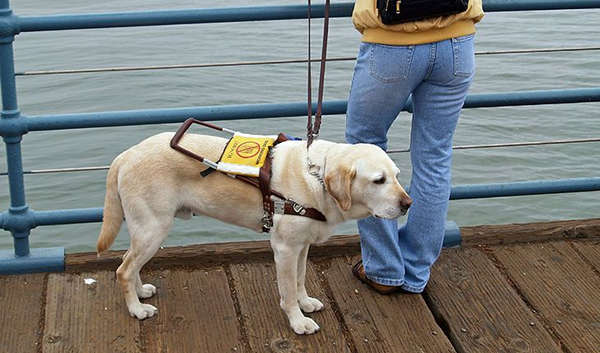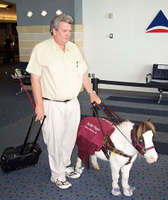For a long time I have been meaning to address the idea of miniature horses as guide animals. I’ve read about them, their owners, their trainers and even people who make some interesting shoes for them.
Makes Perfect Sense
Recently I ran across a website that doesn’t agree with using horses as guide animals, and it got me to thinking (and reading). Their arguments make perfect sense to anyone who spends time around horses, miniature or otherwise.
This site features articles written by people who actually use the animals to get them through their day safely, the vision-impared.
Purely Instinct
One woman owns a miniature horse (which she competes with in driving competitions) but still she uses a seeing eye dog. She believes wholeheartedly that the dog is a far better suited animal for the purpose and her belief is set in one main biological theory: horses are animals of prey and dogs are hunters.
Horses are hardwired to flee when they are scared, the instinct of a lone herd animal when faced with adversity will always be to run.

Dogs are not as easily shaken, their carnivorous nature makes them more willing to stand their ground and assess a potential threat. Not to mention they can be fiercely protective of those they are close to.
Horses Need Other Horses
Another article discusses the herd mentality of the equine animal and their need for companionship of their own kind. Their guide horse became depressed and listless until it was put around horses again. Dogs are pack animals too, however they seem far more inclined to accept humans as part of their “pack”.
Need More Reasons?
There are a number of reasons (beyond their biologic makeup) that horses aren’t suitable for this type of work.
- The National Federation of the Blind thinks it’s a bad idea
- They are larger (and less maneuverable) than even big dogs
- Stairs can be challenging for them
- Transportation of the animal requires specialized vehicles
- Horses create 10 – 20 times as much waste as dogs
- Horses require specialized lodgings
- It will be awhile before they allow horses on public transportation
- Horses will probably never be allowed in all restaurants, supermarkets, banks, etc.
What is Your Take?
As always, I turn to my readers to get their opinion about this subject.
What do you think? You are the expert because you know and love horses. Are they suitable animals to entrust with the job of seeing for a person who can’t?
I’m leaning towards a big fat NO.

Having seen a mini horse cheerfully trip around theme parks in Orlando, I’d be inclined to say that like everything else involving animals, you can’t define an entire breed or species as “appropriate.” It comes down to individuals.
I mean, dogs chase squirrels. So by that definition, dogs are definitely poor choices for seeing-eye guides. Imagine, you’re just walking along Central Park West and your dog sees a squirrel on the other side and boom, you’re under a taxi.
I think it’s a bit heartless of the web site author to create something like this. Your personal opinions and disagreements should not get in the way of people who have made friendships and partnerships with their ponies OR their dogs.
My main objective in writing this article was to educate people about the pros & cons of miniature horses as guides for the blind. But as I started researching I realized the cons far outweighed the pros. While it’s a cute idea, most of the hype about using them comes from the same people who breed & train them. My opinion is only voiced at the end of the article & is 100% shaped by the facts…which speak for themselves.
Well we know that horses are empathic and easily pick up on human emotion, so they would respond to their”herd” (their handler and family) and their reaction for the flight response. Horses are trained to disregard this response all of the time, just look at police horses, horses that people hunt from, etc.
It is also NOT a new thing for a horse to take care of a handicapped or blind person at all. If they were that unpredictable, then why would we have the handicapped ride for therapy?
If you are a city dweller that uses public transportation, a dog would be best, but for someone who lives more suburban, can house the horse and needs the stability of the horse, then it may be best. My mother who is unstable due to rheumatoid Arthritis would benefit from the horse as they are more inclined to allow her to use them to lean on and can handle the load.
It just depends on the person, the place and the situation. Blanket responses are rarely a good thing! there are no cookie cutter situations.